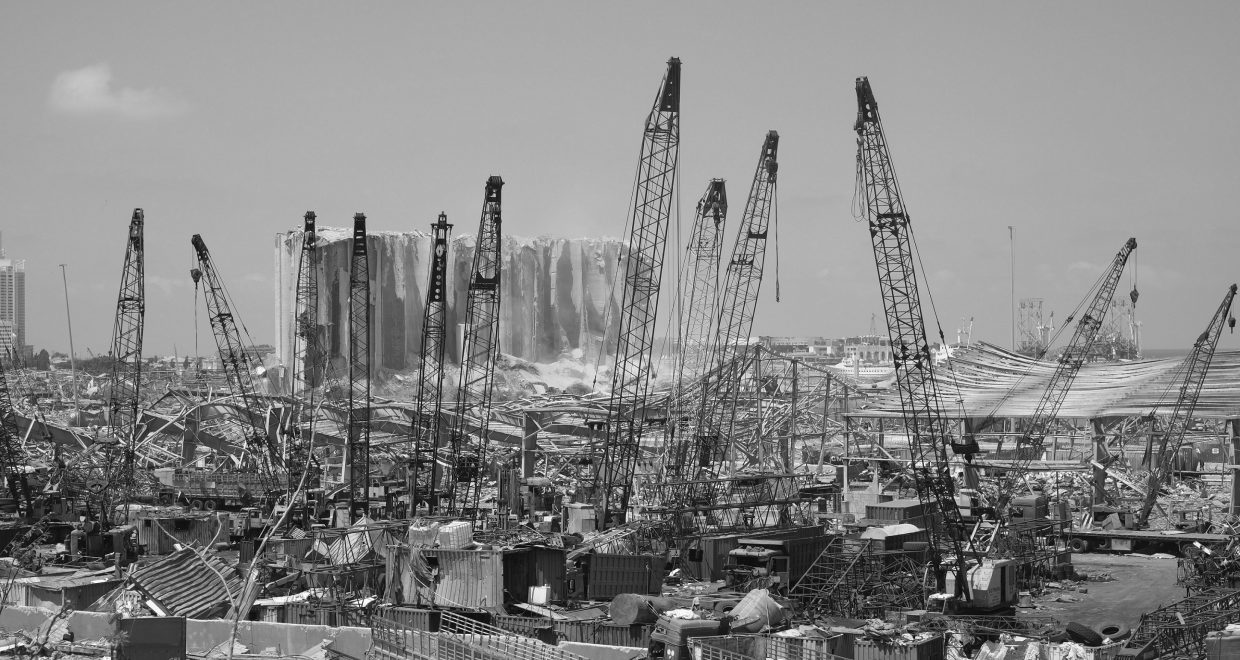What I Saw in the Beirut Blast
I was sitting in a Beirut café reading Kundera when a blast rocked the city a few weeks ago, on August 4. In rapid succession, two explosions wreaked havoc miles around their epicenter in the Beirut port, and killed scores. Immediately after the first bang, I felt targeted by an irrepressible wave of intense power heading towards me. Seconds later, a following boom shattered my surroundings and destroyed windows in front of me. I was hit in the forehead by glass shrapnel and began bleeding profusely. As I stepped out of the café frantically searching for my wife, who was shopping nearby, scenes of panic unfolded in front of my eyes – or, at least, the one eye that wasn’t filled with blood: shoppers hurrying to leave an adjacent mall in a movement verging on a stampede, mums holding kids and running away, people bleeding, heads and bodies covered with blood, debris, and ashes … Armageddon now had come to Beirut that day, and I was in the midst of it.
“Is she alive?” … that was my first thought as I looked for Julie, my wife. She was unharmed, in fact, but I only found her after ten minutes of searching everywhere amidst the panicked crowd. My second thought went to my parents: they spend their summers in our country house and they needed to know I wasn’t dead. But blood was all over my phone and I couldn’t call. Lines were jammed which didn’t help. Eventually, my mother managed to reach out and I lied to her through my teeth: “Oh. So there is a blast in Beirut? We are away and didn’t hear a thing!” I repeated the same falsehood to a frightened aunt on the phone, as I ran with Julie towards her parents’ house, and then followed the trail of blood to a close hospital. The scale of carnage became clearer to me there: corpses pilling up, mutilated bodies, grownups wailing like babies, and little ones too shocked to scream or cry … though my bleeding was ongoing, it didn’t feel morally right to ask for help when surgeons had clearly more urgent cases to work on. So we left the hospital and headed towards another one in the mountains where I reckoned doctors would be under less pressure. I was wrong: others had made the same calculus, and were ahead. I waited for hours until a young doctor finally stitched me up around midnight. My physical pain was minimal but the scenes that evening left a scar deep within my soul. One recollection remains especially vivid: A woman who had lost her legs to the explosion wailed in front of me as she called for her mother. The latter had died, I was told, but the doctors hid the truth from the severely injured woman. I never knew whether they were eventually able to save her life. Why was she in that condition, not myself? I had no answer to that question but one: utter randomness. There was neither sense nor direction to events unfolding and calamity struck whoever happened to be in the way. Haphazardness and absurdity reigned supreme. Though nuns and doctors were gallantly fighting to save lives in that Catholic hospital I was in, my fall from faith became complete that night.
It’s been more than two months since that fateful day in August. Normalcy hasn’t returned to Beirut – expectedly. Lebanon is stuck in the worst political crisis of its turbulent history against a backdrop of economic meltdown and incredible social suffering. The poorest of the Lebanese are drowning in the Mediterranean as they seek to flee the inferno towards Cyprus. One can breathe their despair with the oxygen of the broken city. Meanwhile, the same old struggle for spoils and power continues pitting the country’s factions against one another. Whatever disaster hits the bottom of the social pyramid does not affect its top. Nor does it change much to the regional and international rivalries unfolding above our heads, on our land. As I think about all this, I cannot tell when the next tragedy will strike Beirut. What I can tell is this: when it does, more people will die, but the cruel game that led to their demise will continue unchanged. If there something we ordinary Lebanese know for certain, it is this: our lives are cheap just as our country is expendable.
Hicham Bou Nassif is an Assistant Professor of Government at Claremont McKenna College. He is the author of Endgames: Military Response to Protest in Arab Autocracies, (Forthcoming with Cambridge University Press).
Photograph at the top: Rashid Khreiss






